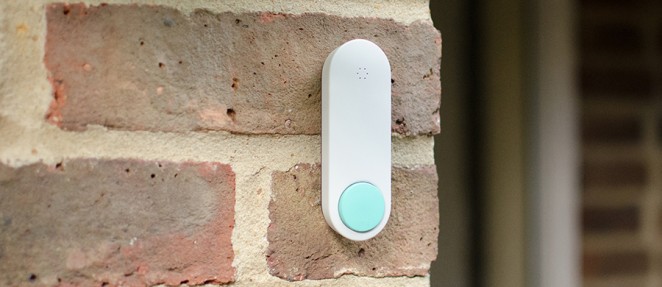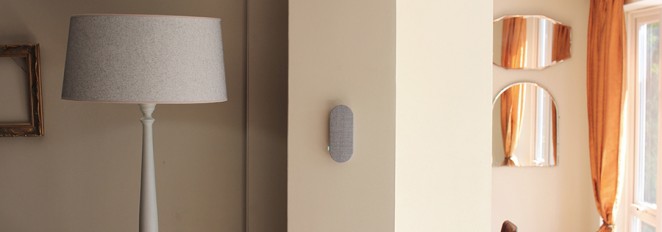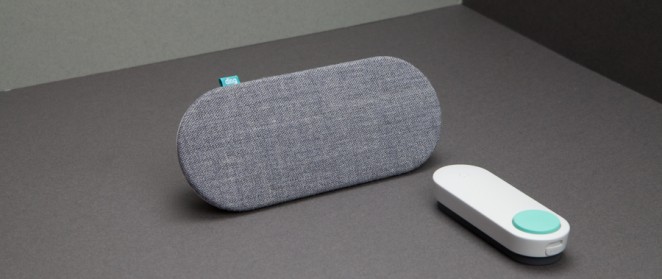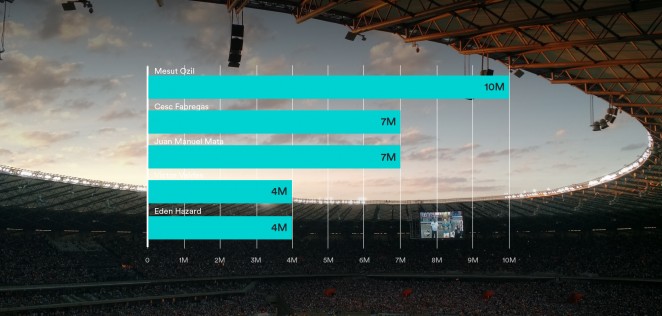The Ding smart doorbell launches on Kickstarter



How many times have you missed the doorbell because you were either out of earshot or otherwise indisposed? And how many times have you wished you could simply tell that nuisance caller to jog on without having to leave the comfort of your favourite armchair? If the answer to that question is; “More times than I can count,” as it is for me, then the Ding smart doorbell could very well be your saviour. OK, that's probably giving it a little too much credit, but it is a pretty neat gadget. It's a simple, elegant solution to a problem many of us are probably not even aware we have. The Ding takes the form of a conventional Ding button that sits on the outside of your home and a Chime box that sits in your home and makes the doorbell sound. What really sets it apart, however, is how the system links to your smartphone. Users are able to converse with their callers through a bespoke app and a small microphone embedded in the button itself and suss out whether or not they are worthy of their time without having to move a muscle. When away from the home, users will also never miss important packages, giving them the option to rearrange delivery or remotely guide couriers to a safe place. Parents can even configure Ding to turn the chime off and instead receive quieter calls so as to not wake sleeping children.
“We have a list of many more ideas and want to apply this same thinking to other forgotten products to make lives easier and more convenient” Avril O’Neil, Creative Director at Ding
Besides being undeniably convenient, the Ding is also a small, beautiful and contemporary device, having been created with the expert help of the Map Project Office design consultancy. The Chime is finished with high quality fabric and can be wall-mounted or conveniently placed on any flat surface and the Button is slim enough to fit on most door frames with a simple ‘click in’ installation. Both come in various colour options to complement most homes and tastes. It's also already been endorsed by leading UK retailer John Lewis, The Design Council and Makerversity, so Ding are in good company prior to launching their Kickstarter campaign to raise $50,000 to take the project into production. The Ding Smart Doorbell is available for preorder now via Kickstarter, with a campaign running through to 10 November, 2016. Special Kickstarter pricing begins at $99 (around £80) with a premium version to be announced during the campaign. The estimated retail price will be $159 (around £130) with the product set to arrive in August 2017. Bargain!
Brandtix uses real-time data to calculate brand power of athletes


Brandtix is the first global sports index platform that provides analytics on a players’s brand value, based on up-to-date athletic performance and social media presence. The website and app were developed by a team of experienced sports marketers to help agents, sponsors, broadcasters, and clubs make informed endorsement decisions. The platform combines real-time, incremental analytics pulled from performance on the field and on social media accounts. An online ‘dashboard’ allows users to view trends in specific time-frames, and can provide thorough statistics on players and their fan demographics. As Brandtix’s data insights are valuable for a variety of sports industry personnel, the platform lets users tailor their experience to suit their needs, including customisable widgets which allow users to integrate data into existing applications. Whilst many athletes might not appreciate the idea of being essentially boiled down to their statistics, it could mean wonderful things for the world of sport's sponsorship.
UK tech sector gets significant cash injection

Whilst I'm not generally one to jump to the defence of the Tories, as a dyed-in-the-wool liberal, I must say I was encouraged by a development which took place at the Conservative Party Conference last week. Chancellor Philip Hammond used the opportunity to unveil a £220 million cash injection into the UK technology sector, with the intention of making the UK a global hub for marketable technology products. Have first p Britain’s creativity and innovation, he said the UK government must “Carefully maintain the conditions that have brought this activity to Britain in the first place. Including the ability to attract the brightest and best to work here in our high-tech industries.” The UK is rapidly become a global magnet for innovative tech companies. One such company which is widely being recognised for its market leading potential in the field of online search is Italian company FacilityLive. They were amongst an elite group of 140 senior leaders and decision makers invited by the government to discuss the nation’s technological potential at the conference. Despite the negativity surrounding the impending split between the UK and Europe following the Brexit vote, Facilitylive was still a key influencer during the conservative party conference, as an Italian company seeking opportunities to develop a presence in the UK. CEO and Founder Gianpiero Lotito also attended various round tables, led by Government Ministers, at the conference, covering subjects such as small business, technology and skills.
“With driverless cars, the IoT and AI no longer science fiction but a close reality, it’s no doubt that the UK are on the path to becoming world leaders in technology”
Of the £220 million set to be shoehorned into the UK tech sector, Hammond said that £100 million would be spent to extend the biomedical catalyst; funding innovative UK life science companies and innovative medical technologies, which could lead to advancements in disease prevention, earlier diagnoses and further specific treatments. A further £120 million would fund the collaboration between universities and the tech industry over the next four years, in order to ensure that more research at UK universities is transformed into viable business ventures. Of course, £220 million might sound like a lot on paper, but in the wonderful world of tech, it's really nothing more than a drop in the ocean. Still, it's a start!
The levitating indoor cloud that's also a bluetooth speaker

When many people discuss “The Cloud,” they don't really know what they're on about, but it's really nothing more exciting than a bank of computer servers. This cloud, however, is something altogether more exciting. Designer Richard Clarkson has created a small, remote-controlled cloud for the home that plays music and flashes while hovering a few centimetres from the ground, creating the impression that your music is literally like thunder! The Making Weather project is a collaboration between Clarkson and Crealev; a company that specialises in creating levitating products. Made from clumps of white polyester fibres, the cloud and its base are embedded with magnetic components that allow it to float a few centimetres off the ground. The cloud has full rotational movement and bobs slightly up and down to create a realistic atmospheric experience. While the base itself must remain plugged in, a rechargeable battery powers the cloud, which also features an built-in Bluetooth speaker and sound-reactive LED lights. Although the design is currently a prototype, the designer hopes it will soon become commercially available. Frankly, so do I!
“Each cloud is hand fluffed so each one is unique; just like a cloud should be”
Cheil Worldwide Creates 'Beat the Street' VR Game to Improve Childrens' Road Safety
Cheil Worldwide have collaborated with the Dutch Traffic Safety Association to create a virtual reality game that teaches young children in the Netherlands the concept of road safety. The country is famous for its cycling, of course, but that fame has a dark side, in that many young children are unaware of how to safely navigate road traffic whilst cycling. “Beat The Street” aims to rectify this problem. In the VR game, young people will experience a wide range of true-to-life dangerous traffic situations and they have to make choices and take action. The motion sensors in the Gear VR headset give the children live feedback so that they are confronted, in a playful way, with the consequences of their actions. The app is a fun experience, partly because the collisions are depicted in a cartoony way, but the idea is that the lessons still hit home. Because the children feel they are genuinely experiencing the event, they create a real memory that they can learn from.
“We’re using new technologies, but in a very relevant way”
Mariska Kloezen, Business Director at Cheil, said: “We’re using new technologies, but in a very relevant way. In this case, you can even contribute something important to society and improve road safety for children. And that’s something every parent will applaud.” The Beat The Street app can be downloaded free from the Oculus Store; it runs on the Samsung Gear VR and most other VR platforms, presumably including the Oculus Rift. Educational institutions in the country can also apply for a free Beat The Street virtual reality set. Honestly, it's great to see VR be used for something genuinely worthwhile, given the recent slew of gimmick apps and experiences that have dogged the landscape over the last few months.
InterContinental and dada communications create virtual tour of the historic Nordheimer building
In more VR news, the InterContinental Montreal and its partner agency Dada Communications are launching a new campaign that includes a virtual reality tour of the ballroom and meeting spaces of the historic Nordheimer building conference centre, which is currently under construction. The video, produced by UNTLD, was debuted during a PR event held on-site, and is the first in a series to be launched by Dada promoting the hotels's new spaces. In addition to being freely available online and used in targeted advertising, the video will also be a tool for the sales team to generate interest in the Nordheimer Conference Centre. The immersive experience amounts to a realistic tour of the three new spaces, the construction works for which will be complete in November. It's not quite as interesting or as benevolent as “Beat The Street,” of course, but it does underline how such ambitious VR experiences are becoming more commonplace.
This lightbulb by Plumen could last a quarter of a century!


Lighting brand Plumen has designed a set of LED Edison light bulbs that it claims have a lifespan of a quarter of a century. The wonderfully named WattNott lightbulbs are based on the design of the classic Edison bulb, which feature intricate filaments that emit a soft, yellow glow. Hoping to update the design, Plumen fitted each bulb with flexible LED filaments; something the brand claims makes the bulb last as long as 25 years before it needs to be replaced. The WattNott range includes seven different models, each available in two colours of glass. All of the bulbs are dimmable. Because of the LED technology, the company believes that the bulb uses up to 80% less energy than a traditional Edison.
“The new filament LED technology is a cost-effective way to create charming and useable light bulbs that hit the Plumen standard”
Launched in 2010, Plumen set out to create beautiful alternatives to standard low-energy light sources, its most recent effort being an LED light with a gold-coloured shade inside the bulb that reportedly makes people look more beautiful. It has so far sold over half a million of its Plumen 001 and Plumen 002 compact fluorescent light bulb ranges; the first designed in collaboration with Samuel Wilkinson and the second created with Bertrand Clerc. The brand won Design of the Year for its Plumen 001 light bulb in 2011, and has recently launched a crowdfunding drive to fund new product launches and kick the business up to the next level. What form that next level might take is unclear, but I'm sure they will illuminate us in due course. Puns.
Benjamin Hiorns is a freelance writer and struggling musician from Kidderminster in the UK.



